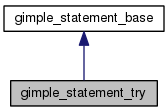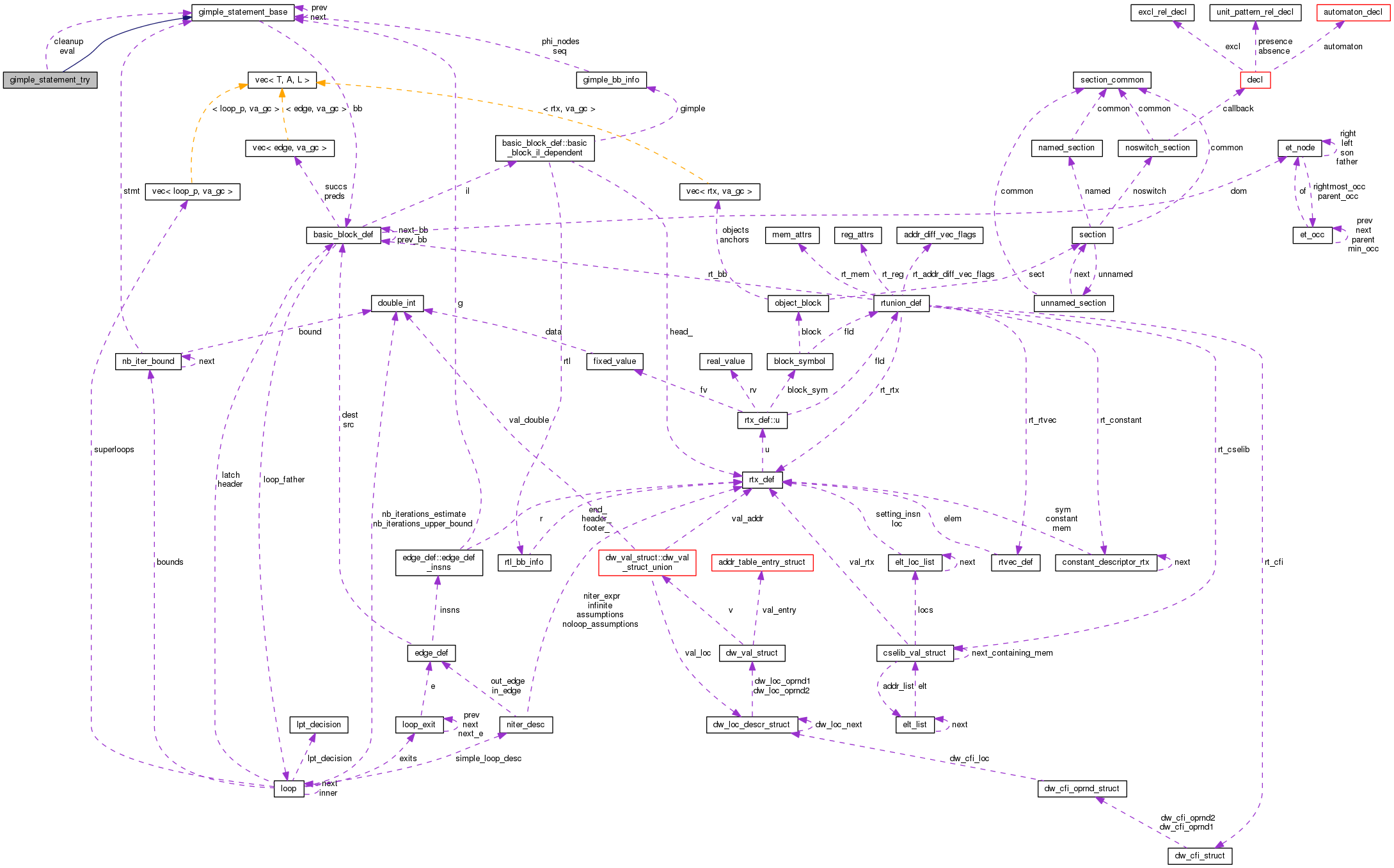#include <gimple.h>


Data Fields | |
| gimple_seq | eval |
| gimple_seq | cleanup |
| ENUM_BITFIELD(gimple_code) code unsigned int | no_warning: 1 |
| unsigned int | visited: 1 |
| unsigned int | nontemporal_move: 1 |
| unsigned int | plf: 2 |
| unsigned | modified: 1 |
| unsigned | has_volatile_ops: 1 |
| unsigned int | subcode: 16 |
| unsigned | uid |
| location_t | location |
| unsigned | num_ops |
| basic_block | bb |
| gimple | next |
| gimple | prev |
Detailed Description
code == GIMPLE_TRY:
GIMPLE_TRY <TRY_KIND, EVAL, CLEANUP> represents a try/catch or a try/finally statement.
TRY_KIND is either GIMPLE_TRY_CATCH or GIMPLE_TRY_FINALLY.
EVAL is the sequence of statements to execute on entry to GIMPLE_TRY.
CLEANUP is the sequence of statements to execute according to TRY_KIND. If TRY_KIND is GIMPLE_TRY_CATCH, CLEANUP is only exected if an exception is thrown during execution of EVAL. If TRY_KIND is GIMPLE_TRY_FINALLY, CLEANUP is always executed after executing EVAL (regardless of whether EVAL finished normally, or jumped out or an exception was thrown).
Field Documentation
|
inherited |
[ WORD 3 ] Basic block holding this statement.
Referenced by gimple_call_arg_flags().
| gimple_seq gimple_statement_try::cleanup |
[ WORD 8 ] Cleanup expression.
| gimple_seq gimple_statement_try::eval |
[ WORD 1-6 ] : base class [ WORD 7 ] Expression to evaluate.
|
inherited |
Nonzero if this statement contains volatile operands.
|
inherited |
[ WORD 2 ] Locus information for debug info.
|
inherited |
Nonzero if this statement has been modified and needs to have its operands rescanned.
|
inherited |
[ WORD 4-5 ] Linked lists of gimple statements. The next pointers form a NULL terminated list, the prev pointers are a cyclic list. A gimple statement is hence also a double-ended list of statements, with the pointer itself being the first element, and the prev pointer being the last.
Referenced by gsi_insert_seq_nodes_after(), gsi_set_stmt(), and gsi_split_seq_after().
|
inherited |
[ WORD 1 ] Main identifying code for a tuple. Nonzero if a warning should not be emitted on this tuple.
|
inherited |
Nonzero if this tuple represents a non-temporal move.
|
inherited |
Number of operands in this tuple.
|
inherited |
Pass local flags. These flags are free for any pass to use as they see fit. Passes should not assume that these flags contain any useful value when the pass starts. Any initial state that the pass requires should be set on entry to the pass. See gimple_set_plf and gimple_plf for usage.
|
inherited |
Referenced by gsi_insert_seq_before(), gsi_insert_seq_nodes_after(), gsi_set_stmt(), and gsi_split_seq_after().
|
inherited |
The SUBCODE field can be used for tuple-specific flags for tuples that do not require subcodes. Note that SUBCODE should be at least as wide as tree codes, as several tuples store tree codes in there.
Referenced by gimple_build_call_valist().
|
inherited |
UID of this statement. This is used by passes that want to assign IDs to statements. It must be assigned and used by each pass. By default it should be assumed to contain garbage.
|
inherited |
Nonzero if this tuple has been visited. Passes are responsible for clearing this bit before using it.
The documentation for this struct was generated from the following file:
